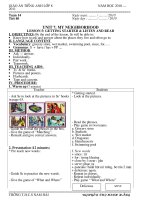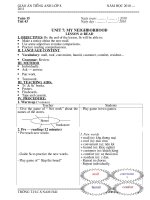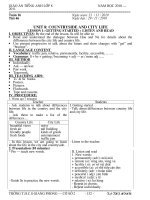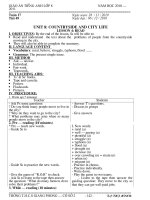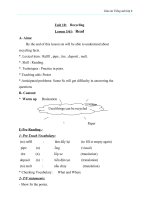GIAO AN TIENG ANH 8 TUAN 10 PPCT MOI NHAT THAI BINH
Bạn đang xem bản rút gọn của tài liệu. Xem và tải ngay bản đầy đủ của tài liệu tại đây (181.24 KB, 8 trang )
<span class='text_page_counter'>(1)</span><div class='page_container' data-page=1>
<b>Tuần 10</b>
<b>Tiết 28</b> <i>Ngày soạn: 03 / 10 / 2010Ngày dạy : 18 / 10 / 2010</i>
<b>Unit 5: study habits</b>
<b>Lesson 3: Read</b>
<b>I. Objectives: By the end of the lesson, Ss will be able to:</b>
Know how to learn the vocabulary in English.
Practice reading comprehension.
<b>II. Language content </b>
<b>Vocabulary: </b> Mother tongue, Make a list, Learn by heart, However, Underline,
Instead, Highlight, Come across, Revision.
<b>Grammar: in order to / so as to + V…</b>
<b>III. Method </b>
Communicative approach
Individually.
Pair work.
Team work .
<b>IV. Teaching aids: </b>
Ts’ & Ss’ books.
Real objects and posters.
Tape and cassette.
Wordcards.
<b>IV. Procedure:</b>
<b>1. Warm up (7</b>minutes)
Teacher Students
- Divides class into four groups and lets Ss
play “Pelmanism”.
- Calls on some Ss practice.
- Checks and gives feedback.
- Listen to the teacher.
- Go on the board and play game.
<b>2. Pre reading ( 10 minutes)</b>–
- Ask Ss to look at the real objects : a piece
of paper, a high light pen … and tell the
ways of learning new words.
<i>? Do you like to learn English vocabulary?</i>
? What do you always do when you have a
new word?
? How many words do you learn a day?
- Today we are going to understand how
many ways of learning new words in
English.
- Ask Ss to can the text and find out the new
words.
- Look at the real objects.
- Tell the ways of learning new words.
- Answer T’s questions.
- Listen to the teacher.
- Scan and show the new words.
<i>I. New words:</i>
sử dụng
quan trọng
write
sentence
lear
n
viết
language importan
t
use
ngôn ngữ
</div>
<span class='text_page_counter'>(2)</span><div class='page_container' data-page=2>
- Pre teach new words.
- Ask Ss to read the information in exercise
1 and give their prediction of “ T” or “ F”.
Students’
prediction answersCorrect
a)
b)
c)
d)
+ Make a list: liệt kê danh sách.
+ Mother tongue :tiếng mẹ đẻ.
+ Learn by heart: học thuộc lòng.
+ However: tuy nhiên .
+ Instead: thay vào đó.
+ Come across: gặp phải.
a) All language learners write the meaning
of new words in their mother tongue.
b) Some learners write examples of words
they want to learn.
c) Every learner tries to learn all new
words they come across.
d) Many learners only leanr new words
that are important.
e)
<i>3. While </i>–<i> reading ( 18 minutes)</i>
- Ask Ss to listen to the tape then tick “T”
or “F” fo each sentences in exercise 1.
- Call some Ss to give their answers.
- Give the correct answers.
- Call some Ss to read the text loudly in
front of the class. ( correct the mistakes if
there are).
<i>II. Read </i>
- Listen to the tape.
- Work individually.
a) False.(NOT all language learners but
only SOME).
b) True.
c) False.(Many learners DO NOT try to
learn ).
d) True.
- Some Ss read the text loudly.
- Ask Ss to work in pairs to answers the
questions in exercise 2.
a) Do learners learn words in the same way?
b) Why do some learners write example
sentences with new words?
c) What do some learners do in order to
remember words better?
d) Why don’t som learners learn all the new
words they come across?
e) What is necessary in learning words?
f) How should you learn words?
- Give the game of “ Lucky numbers” to do
exercise 2.
1. e 2. a 33 4. b
5. c 33 7. d 8. f
a) Do learners learn words in the same way?
b) Why do some learners write example
sentences with new words?
c) What do some learners do in order to
remember words better?
- Work in pairs.
- Play in two teams.
a) No. Learners learn words in different
ways.
b) Such sentences help them remember the
use of new words.
</div>
<span class='text_page_counter'>(3)</span><div class='page_container' data-page=3>
d) Why don’t some learners learn all the
new words they come across?
e) What is necessary in learning words?
f) How should you learn words?
- Call some pairs to practice asking and
answering the questions loudly.
highlight them.
d) Because they want to learn only
important words.
e) Revision is necessary in learning words.
f) Learners should try different ways of
learning words to find out what is the
best.
- Some pars practice.
<b>4. Post reading ( 7 minutes)</b>–
- Ask Ss to close their books and retell how
many ways of learning new words in
English.
? Do you have any special ways to learn
English vocabulary?
- Call Ss to translate the text into
Vietnamese.
- Close their books.
- Retell the ways of learning English.
- Tell their ways of learning newwords.
<b>5. Homework ( 3 minutes) </b>
Learn by heart all the new words
Prepare for UNIT 5 : Lesson 4 – Các phần cần có trong một bức th gửi cho bạn bè,
ngời thân
<b>Tuần 10</b>
<b>Tiết 29</b> <i>Ngày soạn: 04 / 10 / 2010Ngày dạy : 20 / 10 / 2010 </i>
<b>Unit 5:</b>
<b>study habits</b>
<b>Lesson 4: Write </b>
<b>I. Objectives: By the end of the lesson, Ss will be able to:</b>
Give the structure, the main parts of the closed letter.
Write a closed letter to their friends and their folks.
<b>II. Language content </b>
<b>Vocabulary: Heading, Opening, Body of the letter, Closing, Dear, Regards</b>
<b>Grammar: Review the tenses.</b>
<b>III. Method </b>
Communicative approach
Individually.
Group work .
<b>IV. Teaching aids: </b>
Ts’ & Ss’ books.
Posters.
<b>IV. Procedure:</b>
<b>1. Warm up ( 7</b> minutes)
Teacher Students
- Have Ss answer the questions.
1. Have you ever written to someone?
2. Who do you usually write for?
3. What do you often write about?
- Calls on some Ss answer.
- Gives feedback.
- Listen to the teacher.
- Answer the question aloud (maybe in
Vietnamese).
</div>
<span class='text_page_counter'>(4)</span><div class='page_container' data-page=4>
<b>2. Pre writing (10 minutes)</b>–
- Ask Ss to look at the poster of exercise 1.
A
B
C
D
Body of the letter
Heading – writer’s address and the
date
Closing – Your friend / Regard /
Love
Opening – Dear …,
<i>I. Reading.</i>
- Look at the poster.
- Listen to the teacher explanation.
- These are the parts of a letter:
+ Heading (mở đầu) : địa chỉ ngời viết th,
ngày viết.
+ Opening/Salutation( lời chào đầu):
Dear ....,
<b>+ Body of the letter(phn thân / chính bức</b>
th):Bao gồm những nội dung nh:Lí do viết
th, đề xuất, hẹn gặp... thờng đợc chia thành
3,4 phần nhỏ.
<b>+ Closing/ Complementary close (lời chào</b>
cuối th) rất đa dạng tuỳ vào mức độ thân
mật: Regards, Best wishes, With best
wishes, With fond/ warm regards, With
much love, your loving son, with all my
love...
- Ask Ss to read the letter in exercise 1 and
decide which parts of the letter are heading,
<b>opening, body of the letter and closing.</b>
? Who wrote the letter?
? Who received it?
? Which subjects did Hoa get good grades?
? Was her math result good?
? What did her math teacher ask her to do?
? What is Hoa going to do on the Tet
holiday?
- Do individually.
- Compare with their friends.
<b>+ Heading: 12 Tran hung Dao St. …</b>
<b>+ Opening: Dear </b>…,
+ Body of the letter: Thanks for … your
news
+ Closing: Regards, ….
+ Hoa wrote the letter.
+ Tim received it.
+ Hoa got good grades for his Science,
English and History.
+ No, it wasn’t.
+ Her teacher asked her to spend more time
on it.
+ She’s going to Hue tonight to celebrate
the Lunar New Year Festival with her
mother.
<b>3. While writing (</b>– 15 minute)
- Ask Ss to read the information in exercise
2
- You are going to be Lan and you are
<i>going to write a letter to your pen pal</i>
<i>Donna in San Francisco. Now please</i>
answer the questions:
? Which subjects did Lan get good grades?
? Was she good at English and History?
? Where is she going in the Mid – Autumn
Festivel?
<i>II. Writing</i>
- Answer Teacher’s questions.
- Work individually.
</div>
<span class='text_page_counter'>(5)</span><div class='page_container' data-page=5>
<b>4. Post writing (10 minutes) </b>–
- Call some Ss to read their letters.
- Give a modal letter. - Some Ss read their letter.
24 Truong Chinh Street.
Dong Da District, Ha Noi
July 12,2004
Dear Donna,
Thanks for your letter. I am very pleased to hear that you had a happy Mother’s day.
I received my second semester report last month. I got good grade for Geography,
Physics and Math, but my English and History results were poor. My teacher told me to
improve English and History. I think I’ll have to study harder next school year.
In a few weeks we’re going to celebrate the Mid-Autumn Festival. That’s a moon
festival in Autumn or Fall in Viet Nam. I am going to Ha Long Bay with my aunt and
uncle by bus this afternoon and I’m going to stay there with them until after the festival.
I’ll send you a postcard from there.
I am looking forward to hearing from your soon.
With warm regards,
Yours truly,
Lan.
<b>5. Homework (3 minutes) </b>
Write a letter to your friend and tell him about your results of the last semester.
Prepare lesson 5 - Language focus: «n tËp cách dùng trạng từ thể cách, câu gián tiếp
yêu cầu và nói lời khuyên.
<b>Tuần 10</b>
<b>Tiết 30</b> <i>Ngày soạn: 05 / 10 / 2010Ngày dạy : 22 / 10 / 2010</i>
<b>Unit 5:</b>
<b>study habits</b>
<b>Lesson 5: Language focus</b>
<b>I. Objectives: By the end of the lesson, Ss will be able to:</b>
Review the know ledges of unit 5, use the adverbs of manner, modal SHOULD, get
acquainted with reported speech.
<b>II. Language content </b>
<b>Vocabulary: review all the vocabulary in this unit.</b>
<b>Grammar: Adverbs of manner, should, reported speech.</b>
<b>III. Method </b>
Communicative approach
Individually.
Ask – answer.
Pair work.
Group work .
<b>IV. Teaching aids: </b>
Ts’ & Ss’ books.
Pictures
Posters.
<b>IV. Procedure:</b>
<b>1. Warm up (</b>7 minutes)
Teacher Students
- Ask Ss to look at the guiding words and
write sentences.
a) Should / get / early/ Nga / up.
b) Miss / said / you / improve / Jackson /
- Write sentences.
a) Nga should get up early.
</div>
<span class='text_page_counter'>(6)</span><div class='page_container' data-page=6>
your / should / pronunciation / Spanish.
c) Lan’ mother / to / asked / her / the /
tidy / living room.
d) Nam / hard / this / worked / very /
semester.
e) I / try / to / Spanish / I / will / improve /
promise / best / my / my / pronunciation.
your Spanish pronunciation.
c) Lan’s mother asked her to tidy the living
room.
d) Nam worked very hard this semester.
e) I promise I will try my best to improve
my Spanish pronunciation.
<b>2. Presentation (13 minutes) </b>
- Call some Ss to remain the way to use
adverbs of manner.
<b>Adv = Adj + ly </b>
- Nh÷ng tính từ tận cùng là lethì bỏ e
rồi thêm y.
- Những tính từ có chữ cái tận cùng là “y”
mà trớc nó là một phụ âm thì đổi “y” thành
“i” rồi thêm “ly”
- Note the special adverbs.
<i>I. Adverbs of manner.</i>
- Trạng từ thể cách dùng dùng để bổ nghĩa
<i>cho động từ để nói về cách thức làm việc gì</i>
<i>đó nh thế nào.</i>
Ex:
+ bad – badly
+ Slow – slowly
+ Careful – carefully
+Quick – quickly.
+ impossible - impossibly
+ happy – happily.
+ Good – well
+ Hard – hard
+ Fast – fast
+ Early – early
+ Late – late.
Ex:
+ I didn’t study well this semester.
+ They play soccer very skillfully.
- Ask Ss to read the sentences:
+ Mr. Lam should play sports every day.
+ You should do your homework right now.
<i>+ Lien shouldn t go to school today.</i>
? Các câu nói trên có ý nghĩa gì?
- Ask Ss to make some sentences.
? Khi chóng ta nãi l¹i lêi nãi cđa một ngời
với ngời khác ta thờng dùng cấu trúc câu
gì?
- Present the ways of changing the direct
into the indirects.
+ Thay đổi đại từ nhân xng, đại từ sở hữu.
+ Đổi thì của động từ: hạ xuống một thì.
+ Đổi đại từ chỉ định, trạng từ chỉ thời gian,
trạng từ chỉ nơi chốn.
This That
These Those
Here There
Now Then
+ He usually gets up late.
+ She speaks English very fluently.
- Nãi khuyên ai nên / không nên làm gì.
II. Modal should
<b>S + should / shouldn t + V </b>’ …
<i>III. Commands, requests and advice in</i>
<i>reported speech.</i>
- Cấu trúc câu yêu cầu gián tiếp:
<b>S + asked + O + to V –</b> <b>….</b>
- Cấu trúc câu đề nghị gián tiếp:
<b>S + asked + O + to V </b> <b>.</b>
- Cấu trúc nói lời khuyên gián tiếp:
</div>
<span class='text_page_counter'>(7)</span><div class='page_container' data-page=7>
Today That day
Tonight That night
Tomorrow The next day
Yesterday The day before
Last night The night before.
<b>3. Practice (15 minutes)</b>
- Ask to work in pairs to choose the adverbs
of manner to complete the dialogues.
a) Hoa: Does Mrs. Nga speak English?
Lan: Oh, yes. She speaks English <i>well</i>.
b) Hoa: Ba always gets excellent grades.
Lan: That’s because he studies (1) …...
c) Hoa: That’s our bus!
Lan: Run (2) …… and we might catch it.
d) Hoa: I’m very sorry. I know I behaved
(3) ……..
Lan: It’s all right.
e) Hoa: I can’t hear you, Lan.
<i>Exercise 1: </i>
- Work individually.
- Compare with their partners.
1) hard
2) fast
3) badly
Lan: Sorry, but I’m speaking (4) … ….
because I have a sore throat.
- Ask Ss to look at the picture of Mr. Hao’s
house and remark about the house.
- Now, please speak what Mr. Hao should
do to live in the house, use the verbs in the
box.
Ex: Mr. Hao should repair the roof.
- Ask Ss to look at the example in exercise
3: Work with a partner. Suppose you are
<i>Tim s mother. Report Miss Jackson s</i>’ ’
<i>commands and requests in her</i>
<i>conversation with Tim s mother.</i>’
a) “Please wait for me outside my office.”
b) “Please give Tim his report card for this
semester.
c) “Can you help Tim with his Spanish
pronunciation?”
d) “Can you meet me next week?”
<i>- Give correct answers.</i>
4) softly
<i>Exercise 2:</i>
- Look at the picture.
- Give their ideas about the house.
- Work in pairs.
Mr. Hao should paint the walls.
Mr. Hao should cut the grass.
Mr. Hao should replant the trees.
Mr. Hao should mend the door.
<i>Exercise 3 :</i>
- Read the sentences in exercise 3.
- Listen to the teacher.
- Work in 4 groups to do the exercise on the
posters.
- Hang the posters and compare the
answers.
</div>
<span class='text_page_counter'>(8)</span><div class='page_container' data-page=8>
outside her office.
b) Miss Jackson told me to give you your
report card for this semester.
c) Miss Jackson told me to help you with
your Spanish pronunciation.
d) Miss Jackson asked me to meet her next
week.
4. Production (7 minutes)
- This exercise is about advice in reportrd
speech: Now you follow similar instructions
<i>as exercise 3, report Miss Jackson’s advice</i>
<i>to Tim.</i>
a) “Tim should spend more time on
Spanish pronunciation.”
b) “Tim should practice speaking Spanish
every day.”
c) “Tim should listen to Spanish
conversations on TV.”
d) “Tim should practice reading aloud
passages in Spanish.”
e) “Tom should use this dictionary to find
out how to pronounce Spanish words.”
- Give the game of “Lucky numbers”.’
1. a 2. e 33 4. c
5. 6. b 7. d 33
a. “Tim should spend more time on
Spanish pronunciation”.
b. “Tim should practice speaking English
every day”.
c. “Tim should listen to Spanish
conversations on TV”.
d. “Tim should practice reading aloud
passages in Spanish”.
e. “Tim should use this dictionary to find
out how to pronounce Spanish words”.
<i>Exercise 4: </i>
- Work in pairs.
- Play game in two teams.
a. Miss Jackson said you should spend
more time on Spanish pronunciation.
b. Miss Jackson said you should practice
speaking Spanish every day.
c. Miss Jackson said you should listen to
Spanish conversation on TV.
d. Miss Jackson said you should practice
reading aloud passages in Spanish.
e. Miss Jackson said you should use this
dictionary to find out how to pronounce
Spanish words.
<b>5. Homework ( 3 minutes) </b>
Do exercise in Ss’ books in the notebooks.
Lean by heart the usage of reported speech.
</div>
<!--links-->


